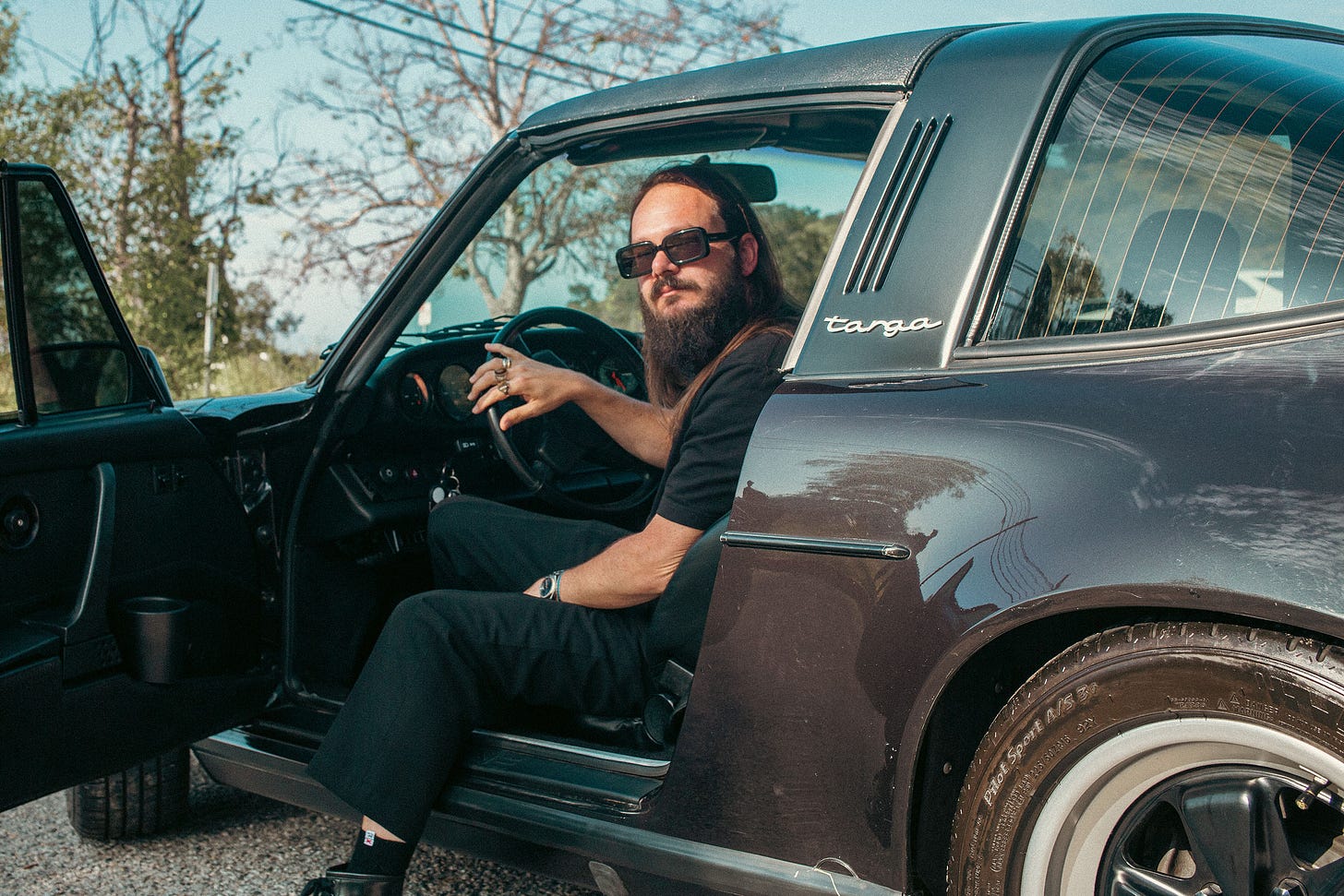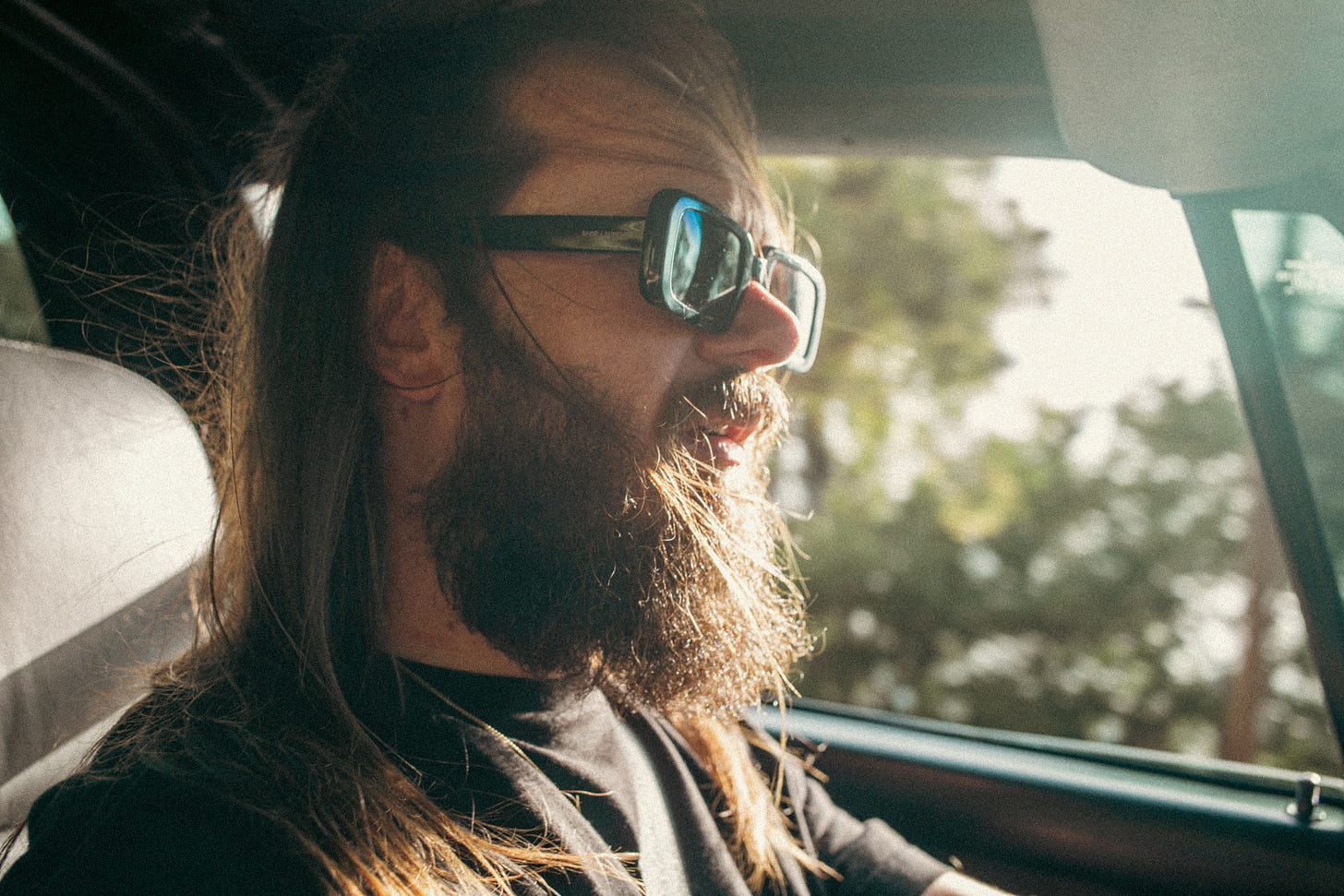GETTING COMFORTABLE
12 questions with futurist and founder, Richard Schatzberger
Richard Schatzberger is in the manifestation business. He doesn’t think of money as money. He thinks of it as energy that allows people to do their best work. He equates success with comfort. No matter where he is, beach, boardroom, laboratory—or whom he’s with—the more comfortable he is in his own skin the more successful he is. The Google 80:20 rule? He goes the opposite way. He believes converting brain frequencies into atoms that form physical and digital objects is a spiritual experience. And he gets there sober with his own signature NA cocktail of imagination and spreadsheets. Schatzberger is CEO and co-founder of ALTR, a nanotechnology platform built to remove the alcohol molecule from drinks. All of it. Or just some of it. The idea here is to wrestle back control from an alcohol industry that mistakes ethanol as a panacea for what people are actually craving—human connection. And he’s assembled some of the world’s best membrane scientists in his desert laboratory to do it. We caught up with the native Londoner (who now splits his time between Cave Creek, Arizona and Beverly Hills, California) on Mulholland Drive, tending to a simple pleasure he says he’d always given up to drink instead: driving.
What’s the biggest misconception about alcohol and creativity?
The writers and poets were wrong. You don’t need alcohol to be creative. That’s the myth that kept me drinking. Even though I knew I should get sober, I was petrified to lose my creativity. I thought creativity stemmed from those pseudo-quiet, contemplative moments in bars, with a drink. Ultimately, it wasn’t that. People worry about leaving their keys and credit cards at the bar. What they should be worried about is leaving that genius at the bar. That’s what happens when you drink. You have amazing ideas. But how many actually come to fruition? The great conversations, the idea, the notepad that I was writing in when I was in XYZ country, thinking that that glass of wine was going to spark the genius, I left at the bar. That’s sad. I wanted to get deeper into it. You don't get deeper into it. You get further away from it when it comes to making ideas happen.
Given alcohol's well documented effects on productivity, why do you think there continues to be so much stigma re: not drinking in creative industries?
It makes you different. Even though the creative industry credits itself with being open, and completely different, and weird, and on the edges, and avant-garde, in reality humans like to find groups of same people. People want everybody to be like themselves. Finding commonality is a big thing.
Why do you think our culture is so attached to the myth of the drunk creative genius?
There’s a lot of money to be made. Advertising does an amazing job at creating culture. And the coolest, most expensive, most-fun-to-work-on advertising has been for the vices. Vices have always been cool. Creatives like to play on that edge. Also, the physical spaces where people gather have been financially built (and literally built) around a bar and the bottles behind it. Dollars have really flowed into that. Where do bands play? Concert venues. How do concert venues make money? Selling alcohol. What better way to sell alcohol than have the coolest person in the room behind the microphone, wasted?
Data suggests that Gen Z folks are way less likely to imbibe as much as their parents. Why do you think that is?
Maybe Gen Z is seeing things differently. But they are also using other substances. It’s not a sobriety thing. It’s a shift in “How do I shift my consciousness?’ thing. In the past, with drinking, you could be invisible. You could get away with a lot. That’s not true for Gen Z. They have a camera in their face 24 hours a day streaming straight to the internet. Being drunk and being sloppy has a different impact. It isn’t behind-the-scenes in a nightclub anymore. It’s on the internet, on a platform. Technology has created a new environment for them to shift their consciousness in. They’re experimenting. And they have more to experiment with in a (kind of) legal way.
What positive trends have you seen for abstainers in the culture?
The fact that we are talking about it is probably the biggest positive trend. Sobriety is hard and will continue to be hard in different ways. If you’re the person who needs help, being sober is not an easy thing. Or, if you just want to cut back a bit, if it’s just not working for you and whether that’s physically because your body doesn’t like it, or it could be work wise, or it could be having a baby, or it could be a million different things, the fact that people are talking about alcohol, moderation, changing habits allows people to say, “I don't feel like one tonight.” I remember one time, when I was younger, I was like, “I don’t feel like a drink tonight. I’m not thirsty.” And somebody was like, “You don’t have to be thirsty to drink.”
What’s one thing that you thought you could never do sober that you’ve done sober?
Long flights.
Has sobriety changed your personal style?
In my earlier years, I would wear things to be the center of attention. I’d do that as theatrics. But I was never comfortable. I needed the drink to wear the things I wore. Now I can be more expressive. I’m comfortable being different. Before I was uncomfortable so I tried to be different. Today, I can turn up at a restaurant in a velvet robe and feel comfortable. Before I didn’t feel comfortable walking into a restaurant without a drink.
What’s your go-to non-alcoholic beverage?
I get looked at very strangely when I order this but I do a tonic water with olive juice chilled in a martini glass with olives. It looks like a martini and you can drink it at the same speed as other people. Getting sober puts you out of sync with what’s happening with everybody else. When everybody else begins to feel the effects of alcohol, you start to separate out. I’ll go home early. I’ll avoid certain moments of conversation because I know I’m not on the same frequency. And that’s difficult. At the beginning of the evening, though, that tonic ’tini puts me on the same speed level as everyone else. I drink it at the same pace. I pick my glass up at the same pace. It’s been a really good tool to ignore not drinking.
What led you to found ALTR?
I still like people. I just don’t want the alcohol molecule. Those two things were mutually exclusive. Going out to where people hang out and have conversations and dinners and things like that and not drinking the alcohol molecule—for me and for a lot of the people I spent time with—didn’t fit together. We started ALTR to get rid of that stigma.
What’s most exciting to you about the alcohol-free beverage market?
Choice. The alcohol industry is still very binary. You either drink or you don't drink. We’ve been dictated by the alcohol industry and society as a whole what you should drink, how much you should drink, what strength you should drink. We’re building a business and technology for people who want choice in their world, to literally dial it depending on the day, the month, the moment. You want half-strength? Go for it. You want quarter-strength? Go for it. You want zero, half, full, mix-and-match? Go for it. As far as ABV goes, we’re the highest alcohol society that there’s been in forever. We’ve equated value and a good time with high ABV. Expensive drinks have high ABV. That has been the sign of quality. That has been the sign of value. Up until now, people have been scared about lowering the ABV. They think that would mean they’d have to lower the cost of the drinks. And that’s what’s really shifted to make the industry blow up right now: people have finally realized you can make the same amount of money with less ABV. It’s the quality of the experience—the quality of the taste—that allows people to charge the prices that they charge. Alcohol is not expensive. You literally clean your hands with it. Ethanol is not a valuable molecule. But society has decided it is. We’ve decided that spirits should be 40%. We’ve decided that wine should be 13%. We’ve decided that beer should be 5%. And that’s got to change. If you look back over history, English beers were 2%. It was about cleaning water. Medicinal wines were carriers of other substances. The alcohol helped a little bit. But it definitely wasn't the point. The industry made ABV the point. That gets in the way of a lot of stuff. Different people have different needs. Alcohol is one size fits all. Doing the ABV math is impossible in today’s society. What can I drink? What’s safe in a night, in a moment, over a lifetime? You don’t know where you are. Especially in the United States where we hide the ABV on the back of the bottle in the smallest type. During the pandemic, something like 50% of Americans reevaluated their consumption of alcohol. That is huge. But right now, your choice is to drink a Heinken 0.0 or a Heineken full-strength. That’s it. That has to change. ALTR offers a spectrum of choice. You can choose where you want to be on your journey.
Can business be a spiritual experience?
Yes. That’s exactly what it is. I don’t know how you’d write this and not make me seem a little Venice Beach but my job, my actual task, is to manifest things—to have a dream, to set it down as a vision, and then make it come true. There’s millions and millions and millions of people who that’s their job, too. A carpenter, that’s their job. A painter, that’s their job. Most jobs are that in actual fact. Anybody who creates things is like: How do I take an idea and make it reality? How do you take brain frequencies and convert them into atoms that get made into physical objects or digital objects or cultural shift points? I feel honored that I get to do that. And if I embrace that, I think even more magical things can happen.
Who gives you hope?
I mentor a high school robotics team in Watts. The TeraWatts. These kids have taught me more than anyone else. If you were to ask me who my mentor is, honestly, it’s these kids. Like, whatever’s going on, just keep on moving. Whatever is happening, if you find your space and fall into it, magic can happen. I’ve never heard somebody upset or say they can’t do something. They’re willing to learn everything. They teach each other. They help each other. And they do it against all odds. The average income in their area is $13,000 a year. Yeah, one three. It’s crazy. They asked me the other day, “How do you manage all the things that you do?” And I’m like, “not as well as you.” They have school. They have family. They have multiple jobs. And they spend every evening and weekend building robots, writing presentations, fundraising. The level of dedication that goes into this is absolutely mind-blowing. And most of them get into college. They give me hope.
Text by Andrew Smart / Photos by Serge Kirsanov






